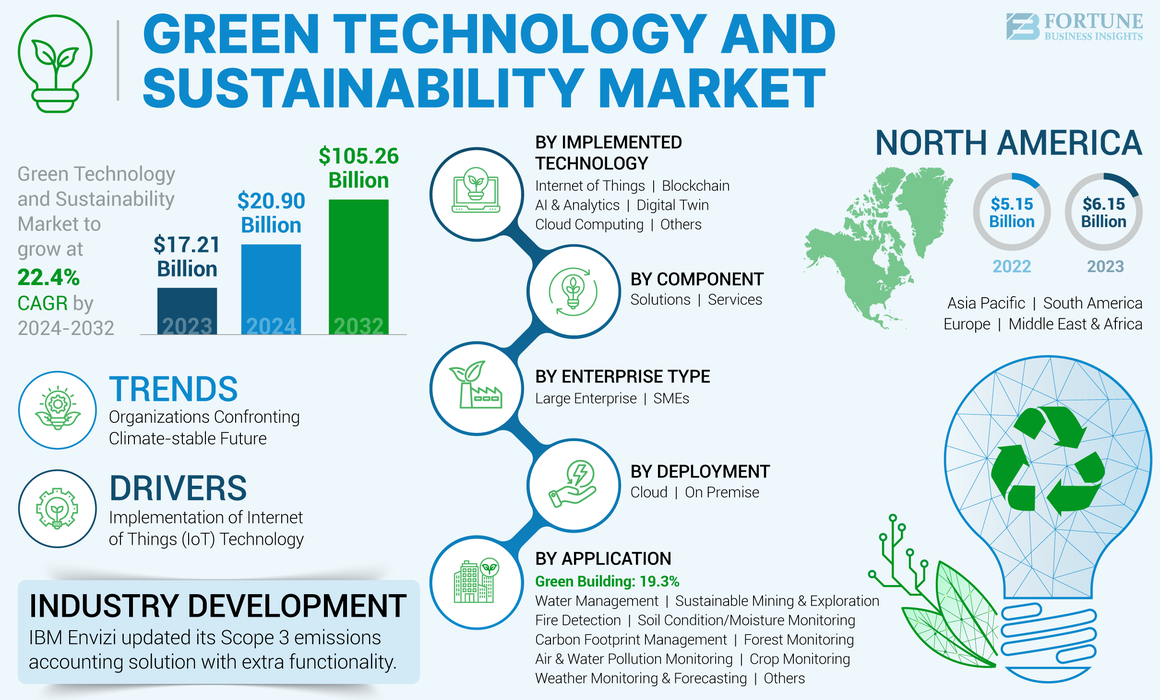Sustainable engineering plays a pivotal role in shaping current industry trends, as the global focus on environmental protection, resource efficiency, and long-term ecological balance intensifies. As industries face increasing pressure to reduce carbon footprints and adopt eco-friendly practices, sustainable engineering has become a driving force in innovation and operational transformation.
Key Roles of Sustainable Engineering in Industry Trends
Addressing Climate Change
Sustainable engineering is instrumental in mitigating the effects of climate change by reducing greenhouse gas emissions and promoting the use of renewable energy. Engineers are developing technologies that optimize energy efficiency, such as smart grid systems and energy recovery units, to minimize waste and reliance on fossil fuels. For example, the integration of renewable energy sources like solar and wind power into industrial operations is now a standard practice in many sectors.

Green technology market size and trends: 10.21Bto10.21Bto105.28B by 2032
Promoting Circular Economy
A core principle of sustainable engineering is the circular economy, which emphasizes the reuse, recycling, and repurposing of materials to minimize waste. This approach is gaining traction in manufacturing, construction, and consumer goods industries. Engineers are designing products and systems with end-of-life considerations in mind, such as using biodegradable materials or creating modular designs that allow for easy disassembly and recycling.
Enhancing Resource Efficiency
Sustainable engineering practices focus on optimizing the use of natural resources, such as water, energy, and raw materials. For instance, in the agricultural sector, engineers are developing precision irrigation systems that reduce water consumption while maximizing crop yields. Similarly, in the industrial sector, engineers are implementing closed-loop water systems that recycle and reuse water to reduce dependency on freshwater sources.
Driving Innovation in Green Technology
The demand for green technology is rapidly growing, and sustainable engineering is at the forefront of this innovation. From electric vehicles (EVs) to energy-efficient buildings, engineers are developing solutions that reduce environmental impact while improving performance. For example, the use of solar panels and wind turbines in industrial facilities is becoming increasingly common, as companies seek to reduce energy costs and carbon emissions.

India's green hydrogen market to grow at 20.26% CAGR by 2030
Supporting Sustainable Infrastructure
Sustainable engineering is transforming the construction industry by promoting the use of eco-friendly materials and energy-efficient designs. Green building standards like LEED (Leadership in Energy and Environmental Design) and BREEAM (Building Research Establishment Environmental Assessment Method) are becoming increasingly popular, as they provide a framework for sustainable construction practices. Engineers are also incorporating smart technologies, such as real-time energy monitoring systems, to reduce energy consumption in buildings.

Sustainable engineering in action: Renewable energy meets modern industry.
Encouraging Corporate Social Responsibility (CSR)
Many companies are adopting sustainable engineering practices as part of their CSR initiatives. By implementing eco-friendly technologies and reducing waste, companies can improve their public image and meet regulatory requirements. For example, automotive manufacturers are investing in electric vehicle technology to reduce emissions and meet government regulations on carbon neutrality.
Adapting to Regulatory and Market Demands
Governments around the world are setting ambitious sustainability targets, and industries are responding by adopting sustainable engineering practices. For instance, the European Union’s Green Deal and the Paris Agreement have spurred the development of sustainable technologies in various sectors. Companies that fail to adopt sustainable practices risk falling behind in a competitive market where consumers and investors increasingly prioritize environmental responsibility.
Fostering Global Collaboration
Sustainable engineering is not limited to a single region or industry; it is a global effort that requires collaboration between engineers, policymakers, and businesses. International organizations and research institutions are working together to develop sustainable solutions that can be applied across different regions. For example, the United Nations Sustainable Development Goals (SDGs) provide a global framework for sustainable development, and engineers play a key role in achieving these goals through innovative solutions.
Conclusion
Sustainable engineering is a critical component of modern industry trends, as it addresses environmental challenges while promoting innovation and efficiency. By integrating sustainable practices into their operations, industries can reduce their environmental impact, improve resource efficiency, and meet regulatory and market demands. As the global focus on sustainability continues to grow, the role of sustainable engineering will only become more important in shaping the future of industry.



